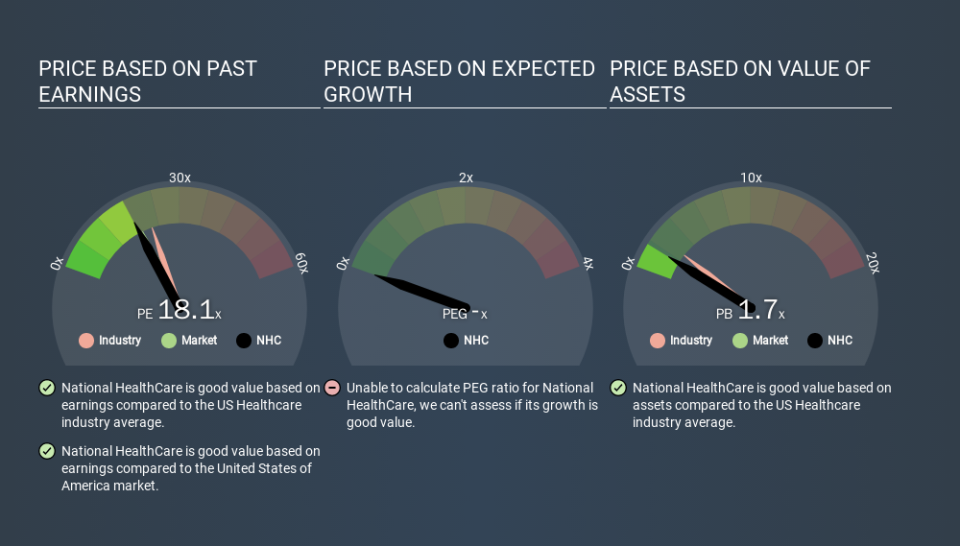Do You Like National HealthCare Corporation (NYSEMKT:NHC) At This P/E Ratio?

Today, we'll introduce the concept of the P/E ratio for those who are learning about investing. We'll look at National HealthCare Corporation's (NYSEMKT:NHC) P/E ratio and reflect on what it tells us about the company's share price. Looking at earnings over the last twelve months, National HealthCare has a P/E ratio of 18.08. That means that at current prices, buyers pay $18.08 for every $1 in trailing yearly profits.
Check out our latest analysis for National HealthCare
How Do You Calculate A P/E Ratio?
The formula for price to earnings is:
Price to Earnings Ratio = Price per Share ÷ Earnings per Share (EPS)
Or for National HealthCare:
P/E of 18.08 = $86.00 ÷ $4.76 (Based on the trailing twelve months to September 2019.)
Is A High Price-to-Earnings Ratio Good?
A higher P/E ratio means that investors are paying a higher price for each $1 of company earnings. That isn't necessarily good or bad, but a high P/E implies relatively high expectations of what a company can achieve in the future.
Does National HealthCare Have A Relatively High Or Low P/E For Its Industry?
We can get an indication of market expectations by looking at the P/E ratio. If you look at the image below, you can see National HealthCare has a lower P/E than the average (21.9) in the healthcare industry classification.
National HealthCare's P/E tells us that market participants think it will not fare as well as its peers in the same industry. Since the market seems unimpressed with National HealthCare, it's quite possible it could surprise on the upside. If you consider the stock interesting, further research is recommended. For example, I often monitor director buying and selling.
How Growth Rates Impact P/E Ratios
Earnings growth rates have a big influence on P/E ratios. If earnings are growing quickly, then the 'E' in the equation will increase faster than it would otherwise. That means even if the current P/E is high, it will reduce over time if the share price stays flat. So while a stock may look expensive based on past earnings, it could be cheap based on future earnings.
National HealthCare increased earnings per share by an impressive 16% over the last twelve months. And it has bolstered its earnings per share by 7.2% per year over the last five years. This could arguably justify a relatively high P/E ratio.
Don't Forget: The P/E Does Not Account For Debt or Bank Deposits
The 'Price' in P/E reflects the market capitalization of the company. In other words, it does not consider any debt or cash that the company may have on the balance sheet. Theoretically, a business can improve its earnings (and produce a lower P/E in the future) by investing in growth. That means taking on debt (or spending its cash).
Such expenditure might be good or bad, in the long term, but the point here is that the balance sheet is not reflected by this ratio.
So What Does National HealthCare's Balance Sheet Tell Us?
National HealthCare has net cash of US$186m. This is fairly high at 14% of its market capitalization. That might mean balance sheet strength is important to the business, but should also help push the P/E a bit higher than it would otherwise be.
The Verdict On National HealthCare's P/E Ratio
National HealthCare has a P/E of 18.1. That's around the same as the average in the US market, which is 18.9. Considering its recent growth, alongside its lack of debt, it would appear that the market isn't very excited about the future.
Investors have an opportunity when market expectations about a stock are wrong. As value investor Benjamin Graham famously said, 'In the short run, the market is a voting machine but in the long run, it is a weighing machine. Although we don't have analyst forecasts you might want to assess this data-rich visualization of earnings, revenue and cash flow.
Of course you might be able to find a better stock than National HealthCare. So you may wish to see this free collection of other companies that have grown earnings strongly.
If you spot an error that warrants correction, please contact the editor at editorial-team@simplywallst.com. This article by Simply Wall St is general in nature. It does not constitute a recommendation to buy or sell any stock, and does not take account of your objectives, or your financial situation. Simply Wall St has no position in the stocks mentioned.
We aim to bring you long-term focused research analysis driven by fundamental data. Note that our analysis may not factor in the latest price-sensitive company announcements or qualitative material. Thank you for reading.

